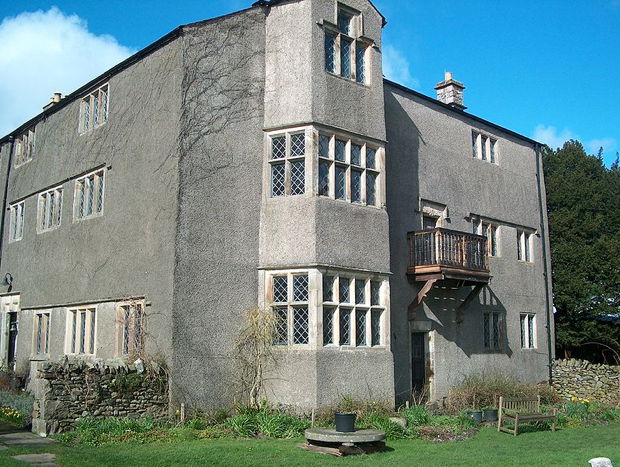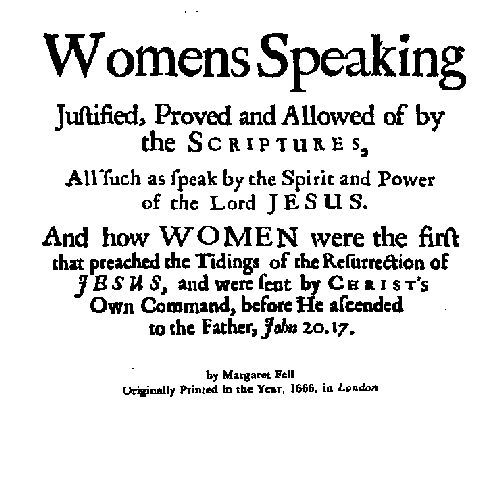“My Dear Hearts, Be faithful every one in your particular measure of God, which he has given you, and in the invisible wait in silence, and patience, and obedience, in that which opens the mystery of God.” — Margaret Fell
With this solicitation, Margaret Fell began her letter to fellow Quakers. The year was 1654, and she wrote to encourage, exhort, and teach the many who had left the Church of England for the simple worship practiced in the Friends Movement. Margaret Fell was a woman of high social station, deep spirituality and strong convictions, and these qualities carried her from obscurity in the north of England to audiences with kings. She was one of the first to be convinced by Quakerism — the movement now known as The Religious Society of Friends, or simply “Friends.” Appreciated early on for her theological perception and her willingness to defend their cause, it was she who wrote the first Quaker Peace Testimony in England. Her home at Swarthmoor Hall became the center for northern Friends, and from there she headed worship and organized rescue efforts for the many Quakers throughout England who were beaten, imprisoned and/or stripped of their property due to their affiliation with the movement. She wrote numerous works explaining Quaker beliefs and defending them against their many opponents.

Swarthmoor Hall.
Margaret Askew Fell Fox (1614–1702) was born in the north of England to a family of landed, lower gentry. Though her home in the north was somewhat isolated, her father saw that she and her sister were taught to read and write. Her social standing and education made her an excellent prospect for marriage, so at age 18 she became the wife of a wealthy lawyer, Thomas Fell (1598-1658). He too was a member of England’s landed gentry, and they became a close and affectionate couple. Together they had eight children. In the years of their marriage he climbed the ranks of Judges, served as a Member of Parliament, and was appointed Chancellor of the Duchy of Lancaster. His ambition left Margaret to raise the family and oversee their property holdings. The isolation of the north and the dearth of places for lodging brought out Margaret’s hospitality. She received the rich and poor alike; her open table brought a variety of interesting, notable, and oftentimes garrulous conversationalists. Everyone in Lancashire knew of this and passed on what they knew of it to strangers.
Those whom Margaret Fell welcomed most at her door were the visitors interested in spiritual things, for Margaret Fell was an earnest Seeker with an enduring desire to know God and to be instructed in the better way. And so it was that one day during one of Thomas Fells’ frequent absences, Quaker founder George Fox (1629-1669) walked quietly up to her door and asked if he might stay and talk with her, for he had heard in the town that she was a woman who would know the truth of Scripture. He came and stayed a few days, hoping to meet her husband as well. This was not to be, but when Thomas returned he found that his wife was a changed woman, as were his children. Somehow she had found her way back to the confident faith of her youth.
Though Thomas Fell did not share her persuasion, he respected her intellect, he trusted the long years of her leadership at Swarthmoor Hall, and he knew well her deep longing to be close to God in all things. Most of all he was taken by the power of her newfound fire. To his credit, he understood the power of God to change the human condition. He was a devout man or Margaret would never have had him. As head of the local Manor he would have lost standing if his family were not present Sundays at the manor Church. For reasons both personal and practical, she agreed to continue attending the local church as always. This was their compromise, with something given on both sides. To be honest, he found George Fox a bit unsophisticated in some things and dangerous in others, but Fox knew his scripture far better than any man, including the local rector the Reverend Lampett. And so it was that despite his misgivings, Thomas Fell allowed him occasional visits and likewise gave his nod to her ongoing Meetings for Clarity and for Worship.
The backdrop for this compromise between husband and wife occurred during the upheaval of the English Civil war, the beheading of Charles the First, the rise of Oliver Cromwell, and the re-establishment of Kings. During all this, persecution of every variety was heaped upon the Quakers and other non-conformist religious and political groups in an attempt to establish order. Through her husband she had learned a great deal about the Law, and with Thomas she arranged defense for many imprisoned Quakers. Her home at Swarthmoor Manor became the hub of Quakerism in the north of England. From there she carried on a vast amount of correspondence and organized the “Meetings” that gathered them together for worship in silence and reverence before Christ. From there they spread out in evangelistic travels, carrying the word that Christ’s death was a divine gift intended for all. In this she and the rest of the early “Valiant Sixty” ran afoul of local magistrates, who regularly wrote inflammatory libelous letters to their superiors.
This took on particular intensity with Friends’ refusal to swear oaths, which they believed to be unbiblical. There also was an uproar when Quakers refused to remove their hats in what they called “outward” honor between classes, particularly in the case of clergy. In the generations of social upheaval and re-alignment, the Friends were stripped bare of any worldly claims, yet they continued to endure. In 1660 Margaret wrote to Charles II, “And for this testimony we are and always have been in sufferings since we were a people, by every change of government and every power that hath ruled . . . for speaking truth in plain, and for exercising a good conscience in the fear of God . . . and not for any evil . . . for we desire to owe nothing to any man but love.” Margaret herself was able to be so vocal because of her social position, which spared her from the most severe difficulties, even after the passing of her husband Thomas. With his death, she was able to travel and write far outside the bounds of Swarthmoor Hall.
Owing in large part to her education, her connection with landed gentry, and her husband’s social stature, the high-powered judges were initially hesitant to imprison her. Working incessantly to stem the tide of terror and loss, she wrote the first published Quaker Peace Testimony. In Fell's 1660 publication, A Declaration and an Information from Us, the People Called Quakers, we have the first official public statement affirming pacifism as a tenet of Quaker belief and practice. She delivered her peace testimony on horseback to King Charles II on the event of her new husband George Fox's arrest while worshipping at Swarthmoor Hall. In the Declaration she described the sorts of persecution, harassment and judicial threats experienced by the Quakers. Here is a brief sample of her response:
Wherein have we offended any man any otherwise then in that we worship God in the Spirit...and for this must we be made the object of merciless men’s cruelty... We are a people that follow after the things that make for peace, love and unity. It is our desire that others' feet walk in the same. [We] do deny and bear our testimony against all strife, wars, and contentions that come from the lusts that war in their members, that war against the soul, which we wait for, and watch for in all people. [We] love and desire the good of all.
Ultimately though, not even her many audiences with the men in power could stem the tide of hatred against the Friends. Thomas Fell had been dead for years, and his mantle of protection passed from their shoulders. Margaret would ultimately share the fate of her beloved Quakers with periods of long imprisonment in the notorious Lancaster Jail. She used these periods to write correspondence, legal appeals on behalf of herself and others as well as books. Given the limits of space, I will mention just one more of her most important works. Her 1666 book Women’s Speaking Justified remains a hallmark in the defense of women’s right to teach and preach. When she was free again, she rode across England in a coach. In her more than two-hundred-mile journey she returned to the south to see for herself what might still be done for those who survived the persecution with their lives. Her last piece of extant correspondence ends two years before her death in her beloved Swarthmoor Hall. At her death, her longtime friend Thomas Camm wrote:
“I know and have seen a great deal thereof, as well as her constancy, valor, and undaunted firm zeal for God and Truth, without any shrinking, and so greatly exemplary to others, to her commendation, God’s honor and glory, as ought not to be buried in oblivion, but to be recorded for posterity.”
